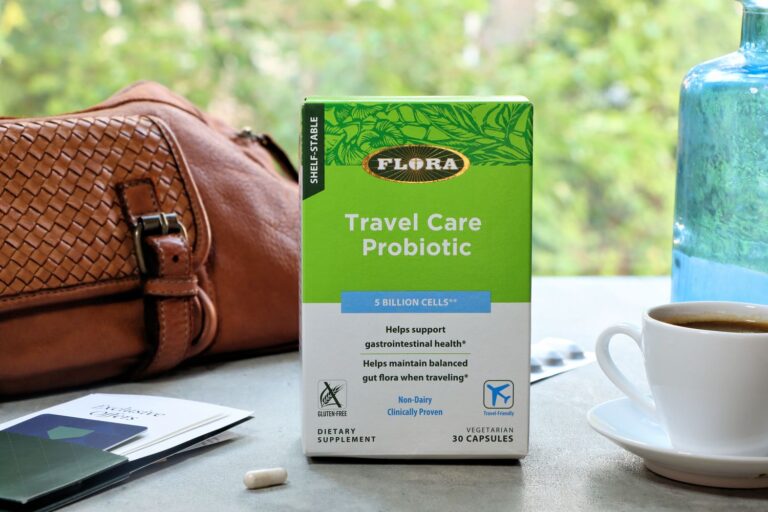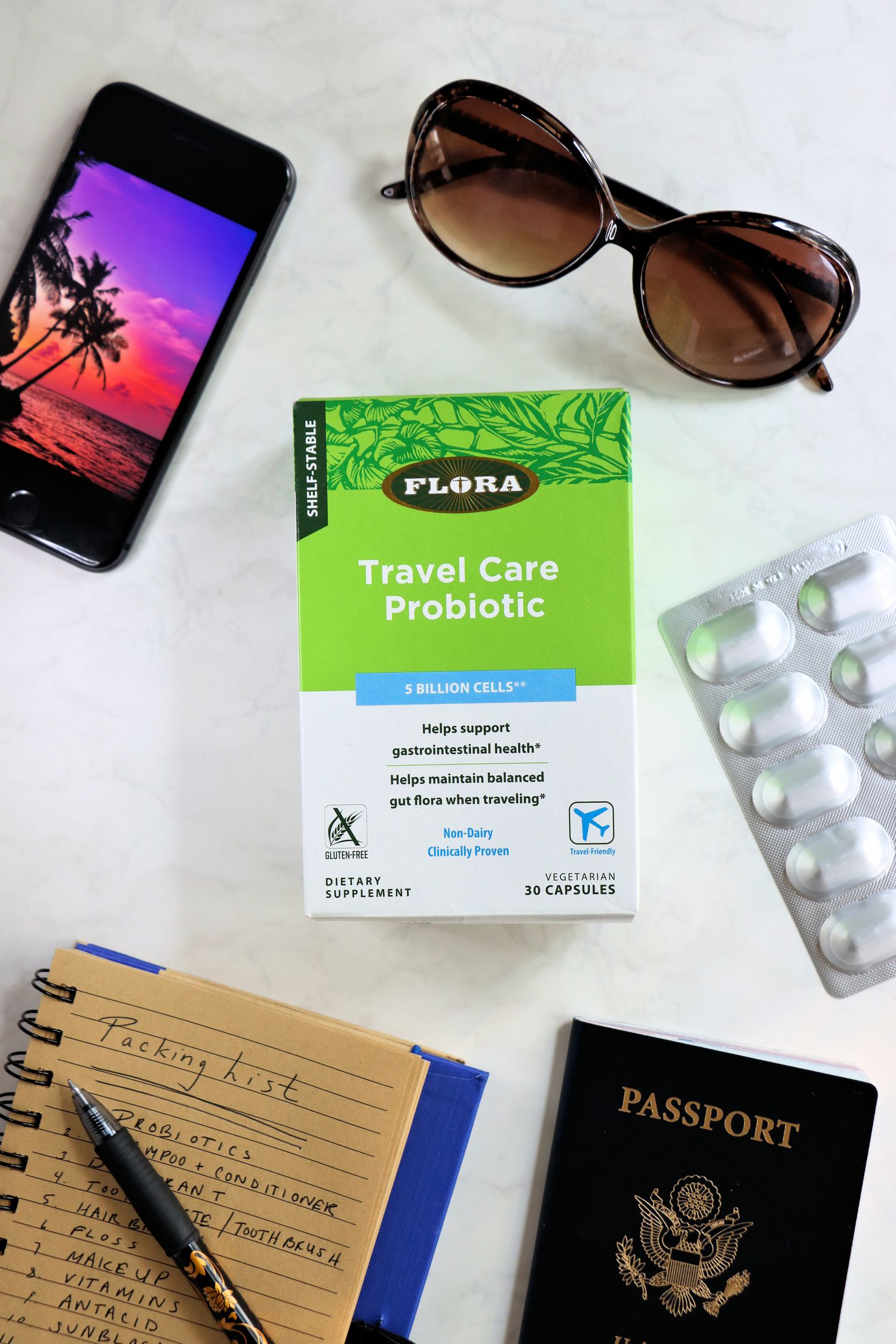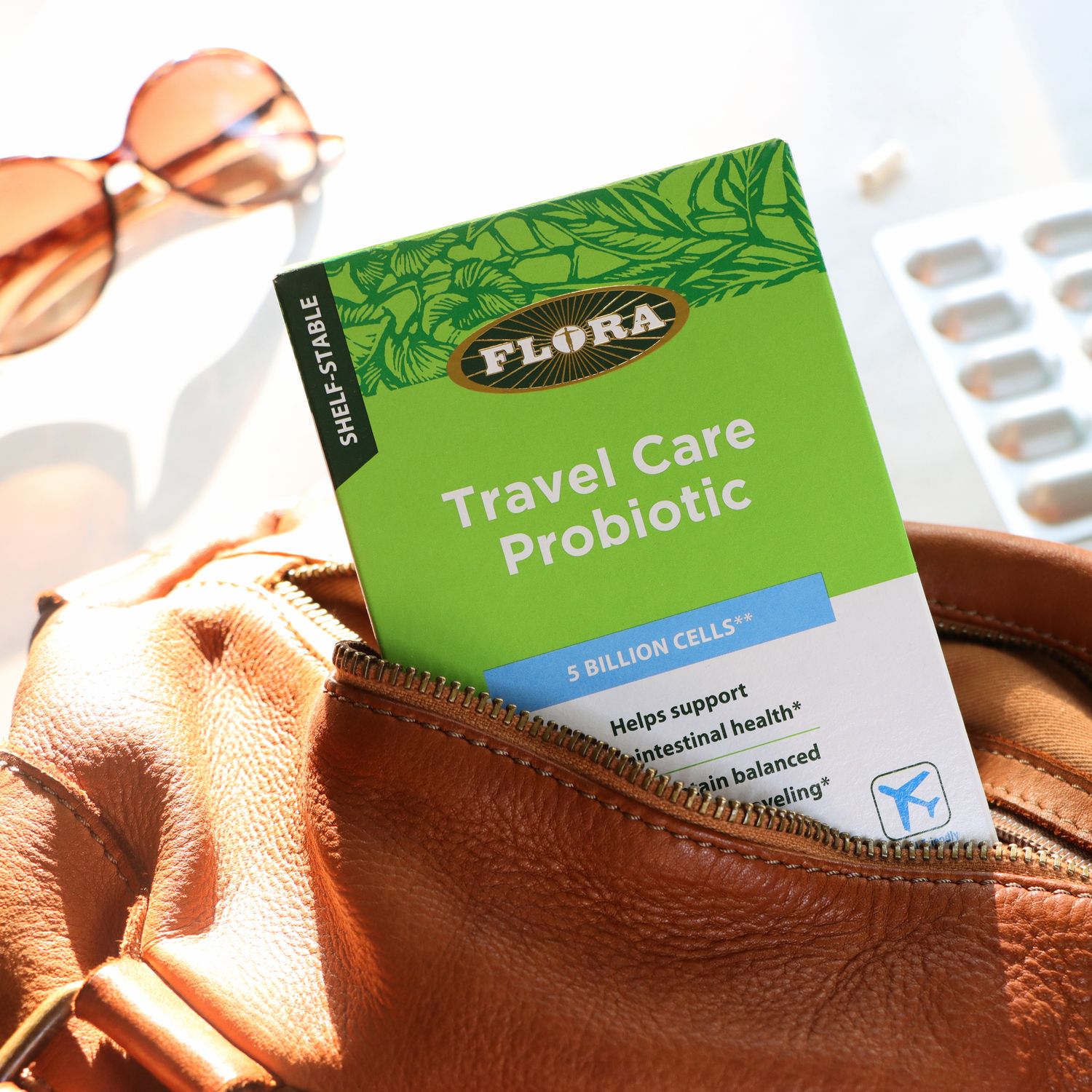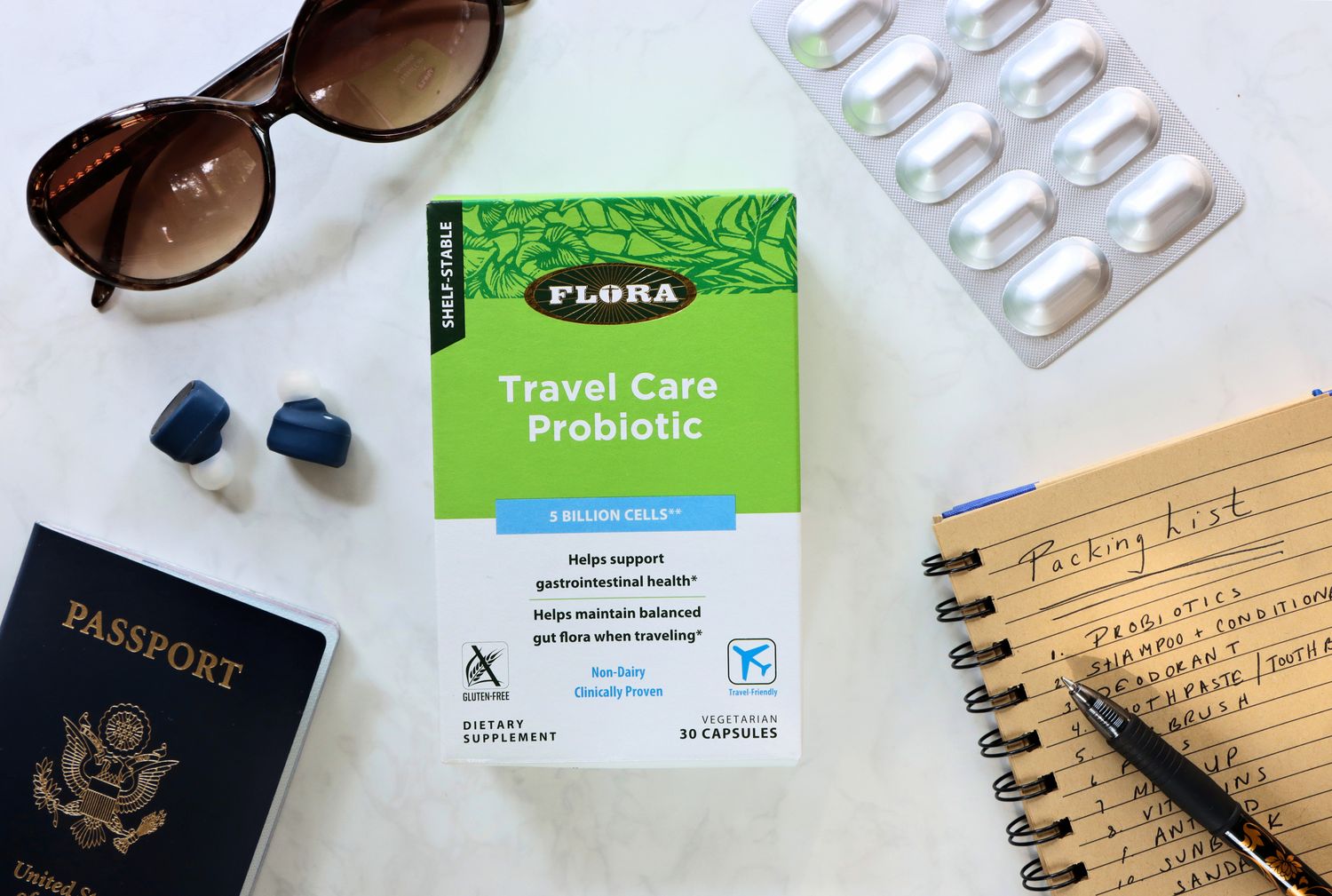Whether we’re planning an overseas dream vacation or a quick weekend getaway, gut health isn’t usually at the top of our to-do list.
But you don’t have to be a globetrotter to know that when tummy troubles hit out on the road, it can make travel miserable. Even if you normally have a gut of steel, it’s easy for it to go haywire even when traveling from state to state.
In this article, we’ll discuss how you can protect your gut health and prevent digestive dilemmas from ruining your vacation.
Why Does Gut Trouble Happen?
It’s incredible to think about, but our digestive tracts (aka the gut or “microbiome”) are home to a system of microorganisms totaling approximately 100 trillion cells housing up to 2000 types of bacteria (1).
Referred to as probiotics, these beneficial bacteria:
- Promote good digestion and regularity (2).*
- May boost mood (3).
- Strengthen and nourish the gut lining (4).*
- Produce vitamins like Vitamin K and B12 and help with the absorption of nutrients. (5, 6).*
These “good bugs” living inside mostly our large and small intestines make up 70-80% of our immune system and are our frontline defense against harmful pathogens and microbes (7).
But when you’re traveling things like stress, changes in diet and jet lag can throw your gut out of balance. This can cause unpleasant symptoms like constipation, diarrhea, bloating, gas, or nausea (8).
Taking care of your gut health when you’re traveling can be challenging.
Here are some tips to help you support your gut health on the go!
1. Stay Hydrated
Drinking plenty of water is essential for gut health. And it’s especially important while traveling to hot or dry destinations. Traveling by air? The dry air inside the airplane can encourage dehydration before you get to your destination.
Water helps the body flush out toxins, prevent constipation, and maintain the balance of your gut flora. Staying hydrated will also help you recover better from jet lag.
Check that the water is filtered and safe to drink at your destination, particularly if you’re traveling abroad. When in doubt, stick with bottled water. If the local water isn’t safe, ice cubes can be contaminated too.
Aim to drink at least 2 liters of water per day. But you may need to drink more if you’re drinking beverages with caffeine and alcohol that can dehydrate and irritate your gut.
With a 95 percent water content, coconut water is a hydrating and healthy alternative to water. It’s also healthier than processed fruit juices, sports drinks and soda, which have added sugar and preservatives.
Coffee is fine in moderation. But over 2 cups which can have 200-300 milligrams of caffeine will trigger dehydration. Switch to decaf or sip herbal teas instead.
💡 Tip: Pack your favorite herbal tea bags so you can have a flavorful coffee alternative to keep you hydrated on the go.
2. Support Your Immune System with Vitamin D
Studies have shown that vitamin D supplementation can significantly strengthen gut cells, the immune system and improve the diversity of our gut biome (9). And the more diverse our microbiome, the healthier we are.
You can get vitamin D mostly from exposure to sunlight and in smaller quantities in foods like fatty fish (salmon), egg yolks, cheese, and fortified milk or cereals (10).
Vitamin D supplements are the best and safest way to get the “sunshine vitamin” we need while traveling. This is especially true if you don’t plan on spending much time outdoors on your trip.
3. Supplement With Zinc
The beauty of traveling is that it exposes us to new things. But along with exciting places, people, food and experiences, that can also include germs. And zinc is an essential mineral that can help support the gut and immune system on the go.
Zinc strengthens the gut lining and can help prevent leaky gut syndrome, a condition where the gut lining has pockets where bad stuff like toxins and bacteria can pass into your blood (11).
The body also requires zinc for the production of digestive enzymes. These help break down our food properly so we can absorb all those good nutrients that keep us healthy (12).
Foods like oysters, beef, chicken, turkey, pumpkin seeds, lentils, and quinoa are good sources of zinc. But when you’re on the go, a zinc supplement can be a more convenient source. It’s usually included in a complete multivitamin.

4. Reduce Travel Stress
Traveling can be a wonderful experience, but delayed flights, lost reservations, and getting ready for your trip can cause stress.
And research has shown that even short-term stress can negatively affect the amount of beneficial bacteria in the gut. This can weaken the intestinal barrier, leaving us vulnerable to digestive upset (13).
A few ways you can reduce stress to improve gut health on the go include:
- Exercise like walking, yoga and tai chi
- Meditation
- Breathing exercises
- Reading and listening to music
Getting out in nature once you’ve arrived at your destination is another great way to relieve stress.
5. Get on Board with Prebiotics (Fiber)
Eating fiber on vacation doesn’t sound like fun. But it can do great things for your gut.
Fiber is a prebiotic. A diet with a healthy amount of plant-based foods with fiber feeds the good bacteria in your gut, which helps them grow and flourish. As they digest the fiber, they also produce short-chain fatty acids (SCFAs). These fatty acids promote healthy digestion, reduce inflammation and nourish the cells in the lining of our colon (14).
Fiber also helps to prevent constipation, lower bad cholesterol levels, and regulate blood sugar (15, 16, 17).
Plant-based foods like bananas, oats, apples, garlic, onions, leeks, asparagus, lentils, chickpeas and nuts are great sources of prebiotics.
6. Pack Some Probiotics
To stay healthy, our microbiomes need to be replenished with probiotics.
Fermented foods like yogurt, kefir, kombucha, sauerkraut, miso and kimchi are natural sources of probiotics. But we don’t always have access to these foods while traveling.
But taking a probiotic supplement daily is a convenient way to support your gut health on the go.
It’s best to choose a probiotic formula that:
- Guarantees the viability of probiotic strains.
- Includes strains that are high quality and well studied.
- Can survive stomach acid so it can colonize the intestines for maximum effectiveness.
Probiotics are measured in CFUs (colony forming units) which tells you how many probiotics are in each serving at the time of manufacture (usually between 1-100 billion).
Higher CFU formulas may look like the best option. But studies show the quality of the strains in the probiotic is more important than the quantity of strains (18).
And if you’re traveling, Flora Health’s Travel Care Probiotic is the perfect choice. Designed based on science and made with clean ingredients, Travel Care Probiotic is formulated with the friendly probiotic yeast strain Saccharomyces boulardii.
Clinically studied for decades, Saccharomyces boulardii supports digestive health and restores gut flora balance (19, 20, 21).
And a 2019 review found that S. boulardii was the most effective in preventing traveler’s diarrhea when compared to two other probiotics (22).
Saccharomyces boulardii may also:
- Stimulate the immune system to help defend against infections (23, 24).
- Support the production of digestive enzymes (25).
- Reduce the occurrence of antibiotic-associated diarrhea and traveler’s diarrhea (26, 27, 28, 29, 30).
Providing 5 billion cells per capsule, Travel Care Probiotic is also:
- Formulated to survive stomach acid so the probiotics can get into your gut intact.
- Not affected by antibiotics.
- Safe for ages six and up
- Gluten-Free + Non-Dairy + Non-GMO
With no need for refrigeration, Travel Care Probiotic is an effective and travel-friendly way to support your gut.
💡 Tip: Start taking Travel Care Probiotic up to a week before you travel to give your gut a boost before you go.
➡ Shop Flora Travel Care Probiotic
7. Take Magnesium
Magnesium is a mineral that is involved in hundreds of biochemical reactions in the body, including many related to gut health (31).
Magnesium can help to relax your intestinal muscles and keep your bowel movement moving smoothly (32). Magnesium can also help reduce stress and anxiety caused by travel, which can affect your gut health negatively (33).
Some of the best sources of magnesium are spinach, avocado, banana, dark chocolate, almonds, cashews, and tofu.
For travel convenience, a magnesium supplement is the way to go.]
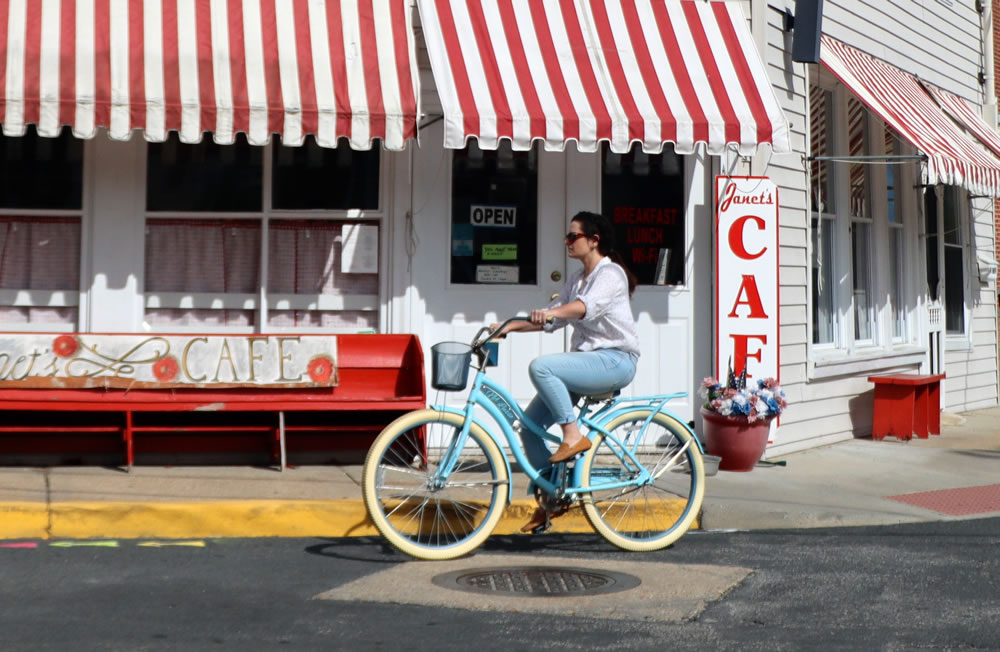
8. Get Your Body Moving
Laying on a beach for a week sounds amazing. But getting active can support good digestion and gut health.
Exercise boosts immunity and mood (34, 35, 36). Exercise also encourages food, nutrients, and acids to move through your intestines faster (37). This can decrease the risk of symptoms like heartburn (acid reflux) and bloating.
But recent studies have also found evidence that exercising can increase the number and diversity of beneficial bacteria which can positively affect gut health (38, 39).
Studies have shown that people who are more active have a better quality and quantity of health-boosting gut microbes (40).
Try to get at least 30 minutes of moderate exercise per day, such as walking, jogging, cycling, swimming, or yoga. You can also do light stretching in your hotel room or on the plane to relax your muscles and ease digestion.
9. Keep Your Hands Clean
Airports, train stations, ride shares, and hotels are magnets for germs.
Washing your hands consistently before eating can prevent you from contaminating your foods with harmful bacteria and viruses that can end up in your gut.
Always avoid touching your eyes, nose, or mouth if your hands are unwashed. And pack sanitizer with at least 60% alcohol for a convenient way to sanitize your hands on the go.

10. Be Mindful of What and How Much You’re Eating
It’s tempting to overindulge when you’re traveling.
Overeating can cause weight gain, but it can also put stress on your digestive system and cause symptoms like indigestion, heartburn, gas, bloating, and nausea
Here are more tips to keep your eating habits on track to keep your digestion running smoothly:
- Avoid processed foods that are high in sugar, fat, and salt which can feed harmful bacteria.
- Limit spicy, greasy, or processed foods which can cause inflammation and gut upset and lead to symptoms like gas, pain, cramps, nausea, vomiting, or diarrhea.
- Try to eat smaller portions and chew your food well, but stop eating when you feel satisfied, not stuffed.
You can eat mindfully and still enjoy yourself. If you have access to a refrigerator, wrap your food if you’re full and take it to enjoy later.
11. Avoid “Adventurous” or Risky Foods
Travel inspires us to experience new things and learn about new cultures. And if you’re a foodie, that also means trying new foods. While it’s fine to enjoy local delicacies or treats, be cautious where you eat, where it’s coming from.
If you’re eating somewhere and you don’t like the way food is being handled or stored, trust your gut. Also avoid foods that are unfamiliar, raw or appear unhygienic, to reduce your risk of food-borne illness to exposure to harmful bacteria or parasites.
If you’re traveling to a place where the water or food safety is questionable, stick to cooked vegetables and peeled fruits. Avoid raw salads, pre-cut fruit, and other raw produce that you cannot peel or wash yourself with bottled or filtered water. These foods can nourish your gut and keep you regular.
The CDC also recommends staying away from food from street vendors because some may not follow proper hygiene or refrigeration practices.
Avoid any street food that is not cooked in front of you and served hot and steaming. High heat will kill most of the germs that cause travelers’ diarrhea.
12. Travel Prepared With a “Gut” First Aid Kit
Before you head out, it’s best to be prepared and pack some over-the-counter meds in your carry-on in case you get some digestive issues.
Traveler’s diarrhea is common and can happen when you’re in a new environment eating food and water from sources your body isn’t used to.
The CDC warns that traveler’s diarrhea can occur anywhere and affect 30-70% of travelers depending on season and location.
High-risk destinations include (41):
- Asia (except for Japan and South Korea)
- Africa
- The Middle East
- Mexico
- Central and South America
To help reduce the risk of getting traveler’s diarrhea, the CDC published a food and safety list.
- Antacids: Made of calcium, these tablets can settle your stomach if acid reflux and indigestion kicks off.
- Bismuth subsalicylate (Pepto): This can treat diarrhea, heartburn, nausea, and upset stomach. Pack the chewable capsules instead of the liquid for easy travel.
- Loperamide (Imodium): This medicine slows or stops diarrhea so you can absorb liquids, electrolytes and nutrients so you don’t get dehydrated. This drug can make you drowsy, so it’s best not to take it unless really needed.
Symptoms of food poisoning while traveling can include (42):
- Nausea
- Vomiting
- Diarrhea
- Stomach cramps
- Fever
- Loss of appetite
Symptoms can start within hours or days of eating contaminated food or drinking unsafe water (43). Food poisoning can be mild or severe, and sometimes it can lead to dehydration or other complications.
If you have food poisoning symptoms while traveling, you should drink plenty of fluids, avoid solid foods until you feel better.
If you have digestive symptoms that don’t improve within a few days, get medical attention.
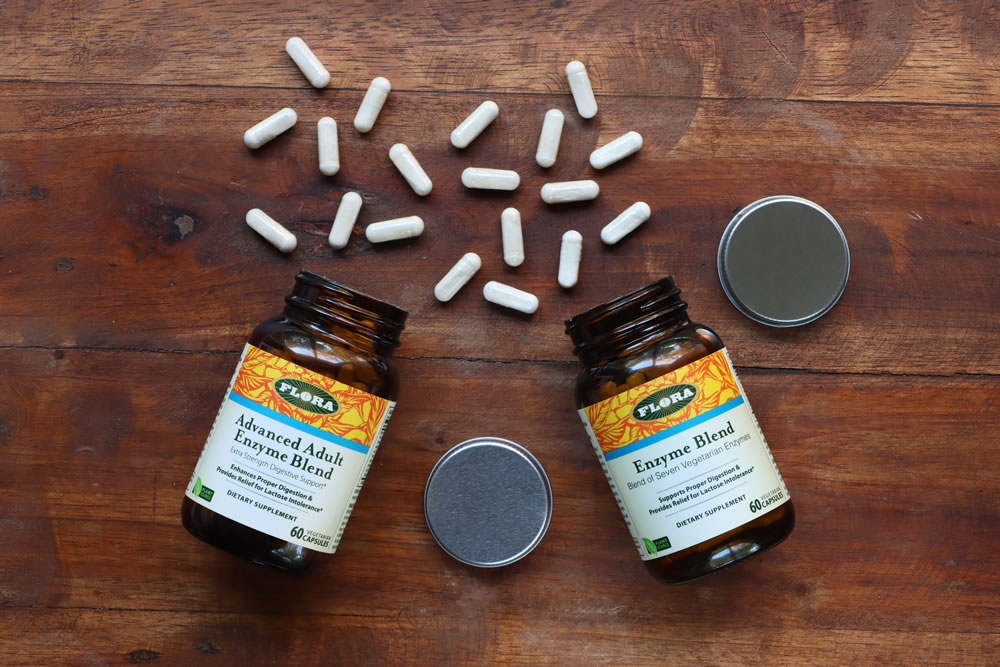
13. Take Digestive Enzymes With Your Meals
While traveling, taking digestive enzymes can also help support healthy digestion and help your body digest food more efficiently. A useful addition to your travel kit digestive enzymes can help ease symptoms like gas and bloating and make you more comfortable.
For a comprehensive digestive enzyme formula to support healthy digestion, Enzyme Blend from Flora is a great choice.* It provides:
- A variety of enzymes including, bromelain, protease 4.5, amylase, lipase, and lactase to support optimal digestion of proteins, fats, carbohydrates, fiber, and complex sugars*
- Support for maximum nutrient absorption*
- An allergen free formula that’s Gluten-Free + Non-GMO + Vegetarian
➡ Buy Flora Health Enzyme Blend
14. Limit Alcohol
There’s nothing wrong with a few cocktails or glasses of wine on vacation. But overdoing it can mess with your gut balance. Alcohol interferes with our natural appetite signals, causing us to eat even when we’re not hungry (44). Alcohol can also cause dehydration, bloating, irritate the digestive tract and speed up digestion, which can cause diarrhea.
What’s worse is that alcoholic drinks loaded with sugary mixers and fruit juices can feed harmful gut bacteria, which can cause nasty symptoms of their own.
While away, try to limit yourself to one alcoholic drink a day.
Final Thoughts
By following these tips, you can support your gut health while traveling and have a more enjoyable trip. Remember that your gut is your friend on your journey. Treat it well and it will treat you well too!
💡 Want to support your gut health on the go? Visit FloraHealth.com to try Travel Care Probiotic.
*These statements have not been evaluated by the Food and Drug Administration. This product is not intended to diagnose, treat, cure, or prevent any disease.
Better Living uses affiliate links. If you make a purchase through them, we may receive a small commission (for which we are deeply grateful) at no cost to you.

